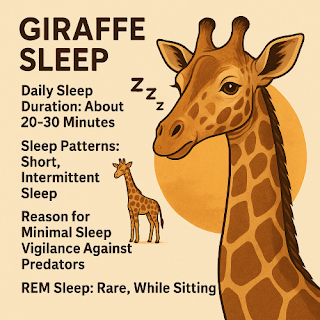Why Do Giraffes Sleep So Little? The Truth Behind Their Sleep Habits
We often picture giraffes gracefully walking across the African savannah. But did you know that this unique animal sleeps only about 20 to 30 minutes a day? Today, let's explore the extraordinary sleep habits of giraffes and the evolutionary logic behind them.
Only 20 Minutes a Day – Among the Shortest Sleep in the Animal Kingdom
Most mammals enjoy several hours of sleep, but giraffes are different. Studies show that giraffes survive on just 20 to 30 minutes of sleep per day. Even this is broken into short intervals, with giraffes taking quick naps of 1 to 5 minutes mostly during the night.
Why Do They Sleep So Little?
The answer lies in their ecological environment. Living in open grasslands makes giraffes vulnerable to predators. Their long legs and large bodies make lying down and standing up slow and risky. So, staying alert and ready to flee is a key survival strategy.
What Does a Giraffe’s Sleep Posture Look Like?
Sometimes giraffes lie down, twist their necks around, and rest their heads on their hindquarters. This rare posture is when giraffes enter REM (rapid eye movement) sleep, their deepest sleep state. However, most of the time, they sleep standing up or take short dozes with their eyes closed.
Lack of Sleep – No Health Issues?
Surprisingly, this short sleep schedule doesn’t negatively affect giraffes’ physical condition. They maintain energy by taking micro-naps during the day and remain constantly alert to avoid predators. It’s a fascinating example of how nature selects the most efficient survival behavior.
Compared to Humans
While humans need an average of 7 to 8 hours of sleep, giraffes live healthily with less than 1/15 of that. It’s a clear example of evolutionary adaptation to survival environments.
Summary – Fascinating Facts About Giraffe Sleep
- Daily sleep time: Around 20–30 minutes
- Sleep type: Intermittent micro-sleep, often standing
- Reason: To stay alert for predators and escape quickly
- REM sleep: Rare, and only possible while lying down
Conclusion
The giraffe’s sleep pattern is a result of evolution, very different from humans. To survive in a dangerous environment, giraffes have developed the most efficient way to rest while staying alert. Tonight, before you fall into a deep sleep, try imagining a giraffe standing under the stars, watching its surroundings instead of resting.



